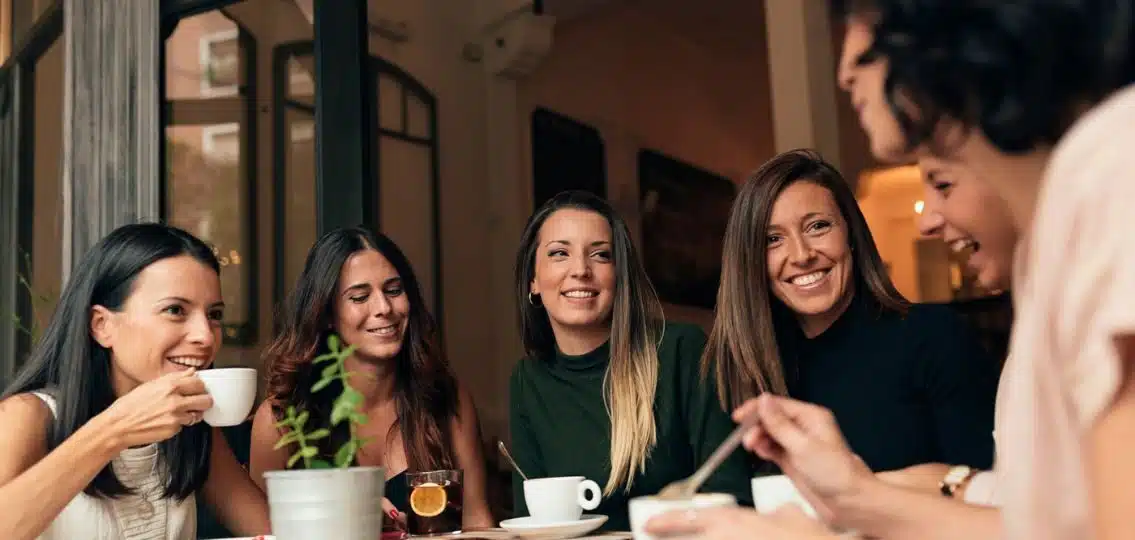I’ve moved six times in twelve years. I’ve been the new person … a lot. In California, when I met another mom at the park, she added me to a group text of twenty other women. Chicago was flush with mom groups ready and willing to link arms with me, even while I was chasing a two-year-old.
Then, the world shut down. And, three months later, we moved.
When the world opened back up, I noticed something strange and disconcerting. Mom cliques exist. In and out crowds exist. Cool kids and social capital exist. And you never know who might be left out.
It seems like in the past few years, cliques have become more difficult to break into, and their very existence makes it harder for us all to make new adult friends.
I’m pretty sure I’m not alone in this belief. The (oh-so-expert) internet is flush with articles focused on the recent shifting landscape of motherhood, and the extra social burden many moms face because of it. Blog posts regularly pop up on navigating mom cliques, mean moms, and what to do when you don’t fit in as an adult. For a lot of us, mom culture has gotten harder to navigate.
I recently took to social media to ask if other moms were experiencing an uptick in divided mom groups. The number of replies surprised me.
“Cliques are hands down the hardest part of being a mom,” one acquaintance wrote.
“Oh, man. So many thoughts. I have never felt like I fit in anywhere,” said another.
“I feel like I’m navigating mom cliques all the time now,” said a friend six states over.
Moms messaged me about being snubbed by other moms, explicit cold shoulders or popular moms at dance class who invite everyone else over for coffee except them.
Then someone added another layer to the rejection we all felt.
“There are two types of mom cliques,” a friend a few hours away wrote to me. “Intentional and unintentional ones. The unintentional ones are the hardest to deal with.”
My observation is that unintentional mom cliques appear to be driven by moms who are happy in their existing social circles and don’t have the mental space to reach out and make new friends.
It’s an ironic contrast — we live in an age where inclusion is a hashtag, and kids wear shirts that say “kind is cool.” Kind is cool, by the way. So why is it that in the past few pandemic years, we’re still drawing thick, deep lines in the sand to keep people separate?
Masked kids stick with this playgroup. Unmasked over there. Homeschool warriors link arms on Thursday mornings. Public school defenders meet up Wednesday afternoons. Soccer moms roll together on Saturday mornings. The cheer squad spends weekends on the road. We’re divided and then subdivided by our beliefs and our interests. And just when we need support from other moms who are trying the best they can to parent their kids through a pandemic and mental health crisis and gun violence and so many of the other scary situations that pop up on the news day after day, nevermind all the stress that comes with raising a child through puberty — guess what — there is an “us,” and there is a “them” in the mom world too.
I get it. These past few years have been INTENSE. My best friend and I fall on opposite sides of many “trigger-warning” discussions. We’ve been friends for 25 years and we still have to work HARD to engage in them respectfully and with grace. When I imagine having those same discussions with strangers, I can see why so many people opt to stick with people who think and talk the same as they do. It’s easier.
This brings me to my working theory on unintentional mom cliques, which is that the past few years gave us all an excuse to stop trying to make friends. Don’t feel like hosting? Say your throat hurts. Don’t want to get together with people you don’t know? Say your kid has a cold. Only want to talk to people you have known for twenty years because it requires less effort than talking to someone new? Say there is something “going around town.”
The pandemic gave us a carte blanche excuse to socialize less, and with fewer people.
We have created a world that feels more insular. More focused on finding people like us, instead of curating new friends who challenge, interest, and show us a different angle of this prismatic world. In other words, less willing to invite “outsiders” in.
Let me tell you what it feels like to be an outsider, though if I had to hazard a guess, I’d say you already know.
I have lived in our town for three years and I still feel like a newcomer.
No one here is explicitly unkind to me, not even the mean mom cliques which I avoid because I can’t fathom being friends with someone who chooses to make power plays.
People wave, and smile, and ask how I’m doing, which seems friendly. But let’s be clear, these niceties don’t translate to offering friendship. So far, no one has tried to become my friend.
I had to scrape and scrounge for the handful of friends I have. Hosting playdates when no one invites my kids over. Hosting dinners when couples don’t reciprocate. Asking people for coffee. Meetups at the park. Barbeques.
There are moms I would like to be friends with, but there is never enough time or space for me in their schedules. Their rejections feel personal, as if they don’t like me enough to want to reach out and invite me in.
Look, I understand there is little incentive for moms to make an effort to include someone new when they already feel comfortable in their established friend groups. Maybe this is all a numbers game and if I keep on trying, one day I’ll break through. But also, it is very, very hard to build community when everyone’s dance card is full.
Making new friends as an adult is exhausting. Maybe I should just quit? My answer will always be no.
Yesterday, my son came home from school and said, “Mom, do you know you live longer if you have good friends?” “Yes,” I told him. “Yes, I do.”
I want friendship so much, I can’t let all this rejection stop me.
Deep adult friendships help me feel rooted, grounded, and understood. Sharing experiences and having meaningful conversations reduces my loneliness and stress.
I want to get together to celebrate my friends’ promotions with bottles of wine. I want a friend who will show up in the middle of the night when I go into labor. I need people in my life who know my crap, and my kid’s crap, and still opt-in — and I want to opt-in for their crap, too.
CS Lewis once stated, “Friendship is born at that moment when one person says to another, ‘What! You too? I thought I was the only one.’”
I feel like I’m the only one in this small, rural town still searching for my friend, this other person. Hello? Where are you? I’m doing my best to adapt to the culture here. I’m working hard to put myself out there. Why haven’t you welcomed me yet?
My latest strategy for finding friends is to approach other moms who are standing off to the side, equally unsure of what to do with their arms, and introduce myself. Maybe if I do that, at least for a moment, we won’t feel so alone or like we’re on the outside looking in. Maybe we’ll become friends that way.
When I’m feeling bad about the friendships I lack, I turn to friends and family members who know me and love me. I pay attention to self care. And I connect with people who can provide me with support and understanding.
Even when I make new friends, I still treasure my old ones. I miss my two best friends from Colorado and Arizona, so I allocated funds so I can spend two weekends away with them. We also schedule phone conversations instead of just texting. Despite the geographical distance, we’ve learned we can maintain and even strengthen our relationships with a little effort and by honoring our commitment to each other. I’m so grateful for them. They’re my emotional anchors as I try to build new local relationships here.
If I spend too much time scrolling on social media, chances are I’m caught up in the lives of other moms and comparing their lives to mine. So, rather than scrolling, I’m choosing to prioritize spending time with my family, instead.
I’ve also found it helpful to see a therapist and talk through all the rejection I feel. The therapist taught me to sit with my inner 16-year-old self and remind her to be the kind of friend she wants. I also encourage my inner teenager to keep asking questions, get overly excited, dig deep, and show up.
The tools I learned with the therapist have become a huge help as my partner and I help our boys navigate similar feelings, and help them think through what it means for them to be good friends and how to choose good friends for themselves.
Mainly, I think the reason I wrote this essay is that I want every mom out there to know they are not alone in feeling lonely and wanting a good core group of friends. Some days I feel lonely down to my bones, but I know how good friendship feels and I’ve resolved to keep opening myself up to finding more of it. If I keep my hope alive, I’m sure one day I will find more of my people. And if you’re ever feeling as lonely as I am, I hope that you’ll keep hope alive for yourself, too.
FURTHER READING:
Another essay about parent friendships:
How to Stay Friends with Other Parents After Your Kids Drift Apart
Is your child struggling to make friends? You may find these helpful:
Ask the Expert: My Teenage Daughter Has No Friend
Ask the Expert: I Think My Son Is Lonely Without Friends
Teen Friends and Friendships: How to Be Your Kid’s Safety Net




